Curating Culture: What was this panel?
Observations and impressions of how the Panel unfolded.

Curating Culture
The Curating Culture symposium takes place at the Central Saint Martins Campus of the University of the Arts London, which opened in 2011. Like the Zurich University of the Arts, Toni Areal, the Central Saint Martins Campus was created by converting an existing building. Here in London this involved the renovation and extension of an old granary store. Also as at Zurich University of the Arts, the reasoning behind the project was to unify all the disciplines under one roof to promote exchange between them.
The room allocated for the event is on the first floor. Two of the long sidewalls are fully glazed, offering a view of the old granary store facade, the adjacent atrium and the paved entrance area. It feels a bit like a stage set. Six tables have been set up in a loose zigzag formation, while colourful plastic chairs are scattered all over the place. On each table there is a handful of pens and a stack of A1 paper sheets. Two tables pushed up against the back wall as a buffet support a pyramid of mugs and saucers next to thermos flasks of tea and coffee. At the opposite end of the room a projection screen is suspended from the ceiling, behind a speaker’s podium and a table with four microphone stands of the kind used at press conferences.
A participant of the panel, who is also a lecturer here at the Campus, later remarks that he often thinks of H&M or Marks&Spencer when he sets foot in the buildings, ever since people repeatedly pointed out to him that it looks just like a shopping mall.
Curating Culture, Day Start, 09:30 - 10:00
Contributor’s quote: It all starts a little clumsily. Central Saint Martins has failed to clear a corner full of abandoned artwork and out of a dozen marker pens in the room only a few weren’t dry. And of course, we start a little late.
At ten o clock about thirty people have gathered in the room. Andy Pratt, Professor of Cultural Economy at City University London and one of the hosts, claps his hands and asks the attendee’s not to sit at a table with familiar faces. Each table is already occupied by one of the group leaders he selected. Next to him the co-hosts Mark Dunhill, Dean of Academic Programmes at Central Saint Martins, Christoph Weckerle, Director of the Department of Cultural Analysis at the Zurich University of the Arts and Simon Grand, Professor at University of St. Gallen. After the hosts have jointly greeted the speakers, a young woman enters and places a sheet detailing the day’s proceedings on each table.
The identity of the attendees is only shared with the table they happen to sit at. From the outside, it looks like a homogenous mixture of men and women over thirty, probably predominantly from a university background: lecturers, professors, students and research assistants. Almost all the guests have notebooks and writing utensils with them – there isn’t a laptop or smartphone in sight.
Maybe it’s not really accurate to call this day a panel. The official announcement called it a “symposium”. Andy Pratt is talking again and calls it “an experiment”. He adds: “sometimes we call this a laboratory or an idea-school”. But then he quickly points out that it does not really matter what name we give it.
Andy Pratt also mentions the question of documentation. We all do it in our heads and in our notebooks. Today, the documentation will also be experimental. He introduces Elliott Burns and Pita Arreola. They will keep a live instagram and live writing report of the day.
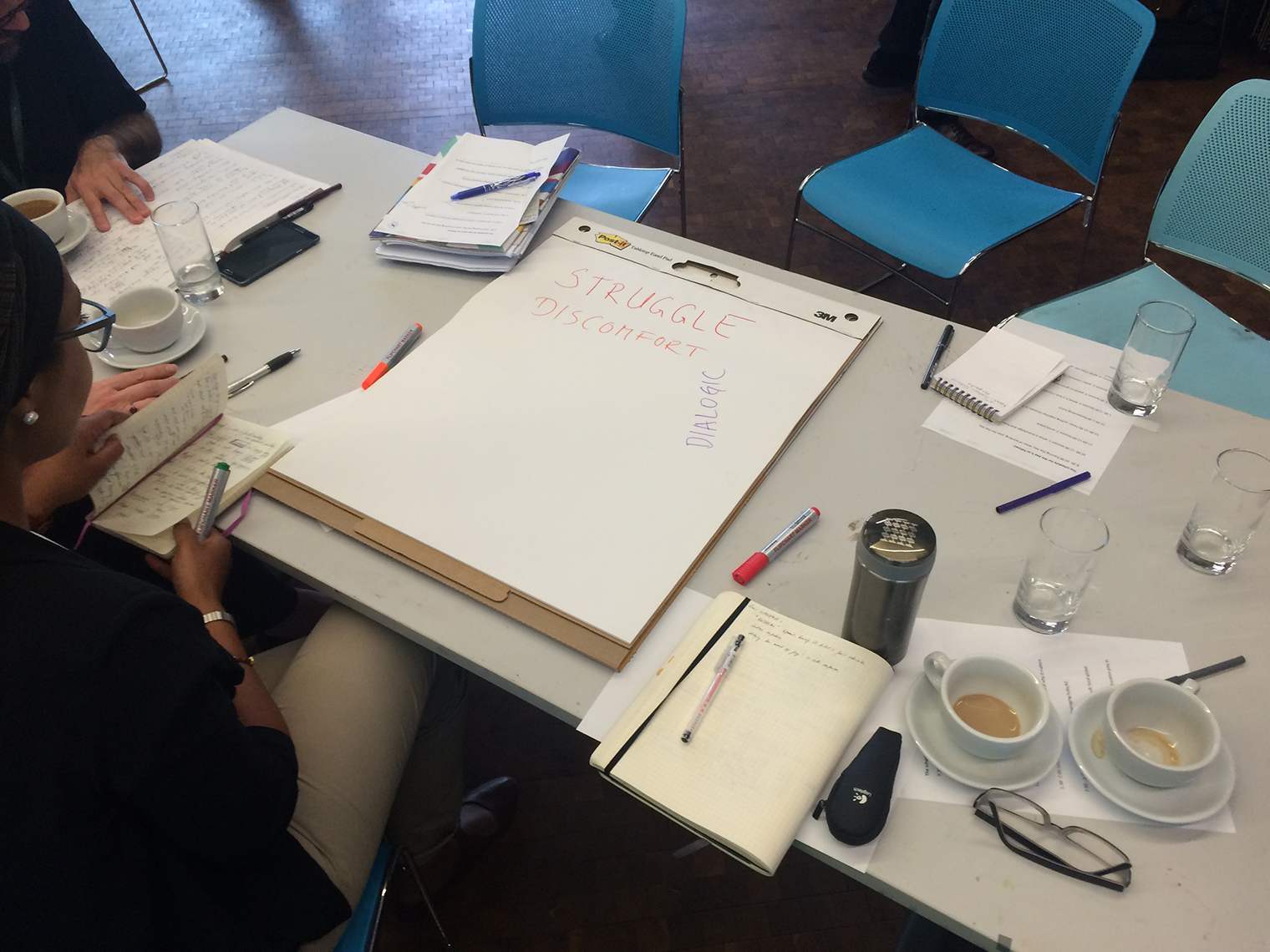
What is knowledge and how is it filtered? Session 1, 10:00 - 11:00
The panel-symposium-workshop-lab-experiment starts off. The panelists are actually more impulse givers rather than lecturers while the attendees are more like participants rather than listeners.
After the hosts have finished their welcoming speech, there is some shuffling around the tables. People finally assemble around five of the six tables. The designated group leaders kick off the discussion at the individual tables, which is quiet but lively and punctured with bursts of laughter. At two of the tables, the A1 sheet is full up with notes and drawings after a short time. The atmosphere is cooperative not competitive. The participants divide their time equally, everyone gets their turn to contribute. It is more about an exchange of ideas and experiences than about giving a platform to individual actors.
Contributor’s quote: The conversation meanders between individuals points of interest, pulling into one subject and then shift out to another.
Only by the end of the allotted half hour has everyone introduced themselves, the detours being so worthwhile. It turns out the table was made up of a graphic designer, a student, tutors from CSM and LCF, the Social Dean at CMS, an economist, and a Professor at the University of St. Gallen.
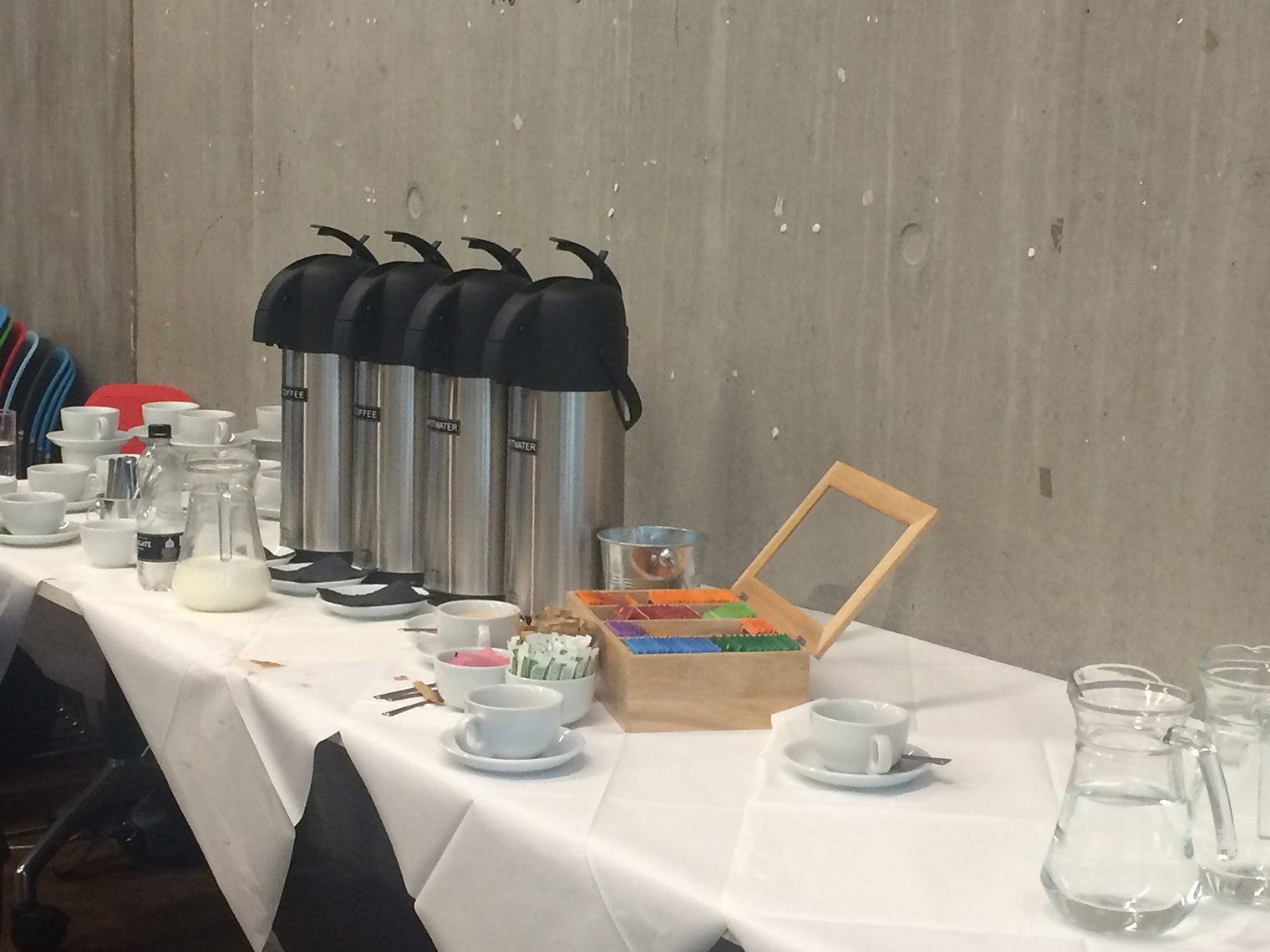
Work & Place, Session 2, 11:00 - 12:00
The pyramid of mugs has whittled down to just one storey. The buffet is cleared and restocked by two women from catering services.
At the tables a short introduction by Dr. Janet Merkel on the topic of co-working is again followed by lively discussion. Simon Grand constantly attempts to structure what is said at his table, emphasising the importance of terminologies, labelling and framing.
Pulling together threads so far, Panel 12:00 - 12:30
Is the central point to find solutions for career starters/young professionals? Or to design the curriculum of the future? The goals of the panel remain unclear after the first half of the day. Shortly after 12, Andy Pratt claps his hands again and asks the group leaders to give an overview of the discussion at the tables during the two group session.
The group leader at table 1 is called Jenny. She gets up to introduce herself and the groups conclusion on this mornings sessions. Andy Pratt listens with a wide-eyed grin, hands on hips, repeatedly nodding his approval. The group leaders at the other tables then emulate Jenny. Andy Pratt thanks each presenter with a benevolent “Thank you – wonderful.” While he gives a short introduction to the afternoon’s events, the two women from catering clear the remnants of the buffet and pile up the brown bags for the networking lunch.
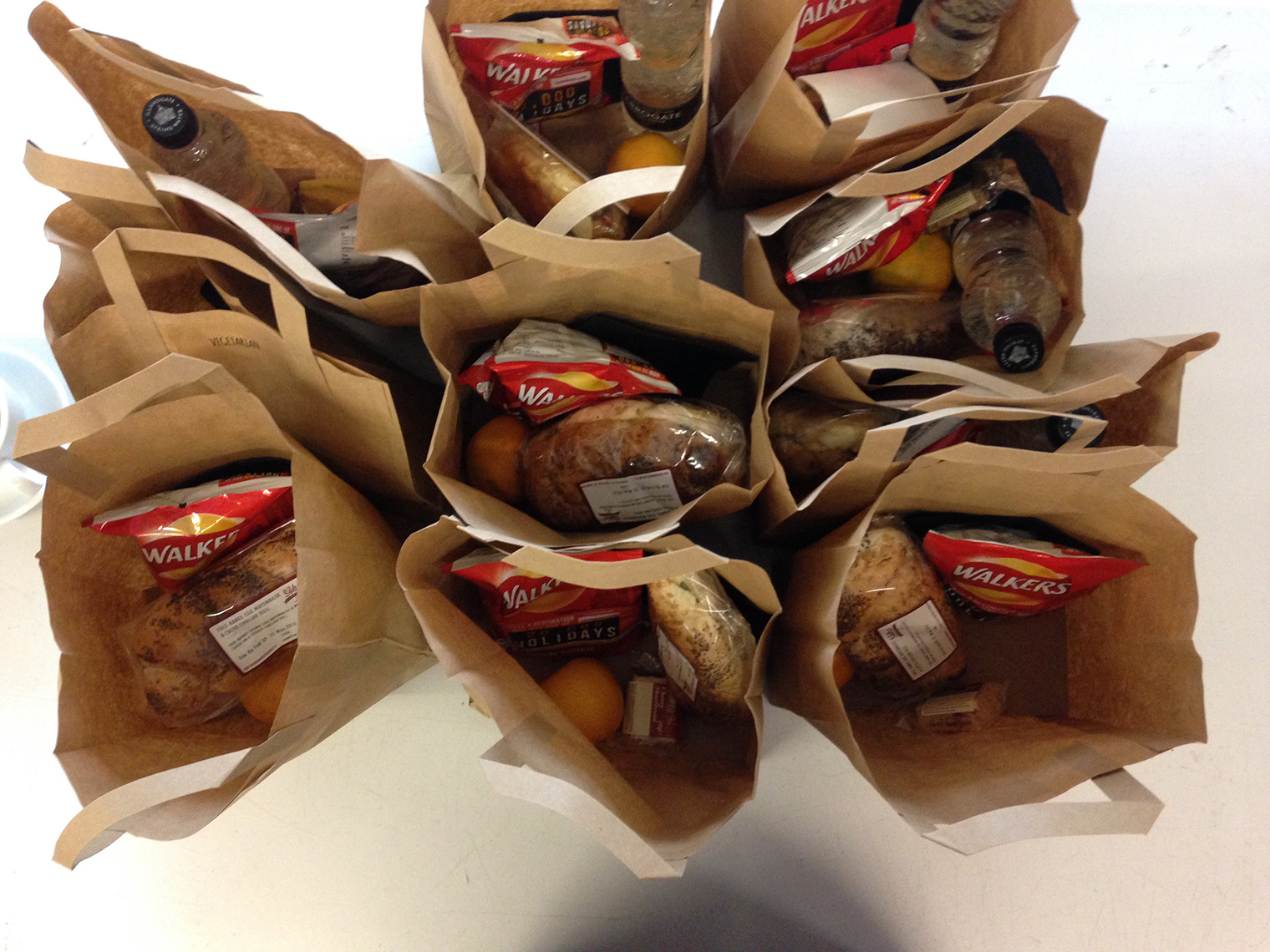
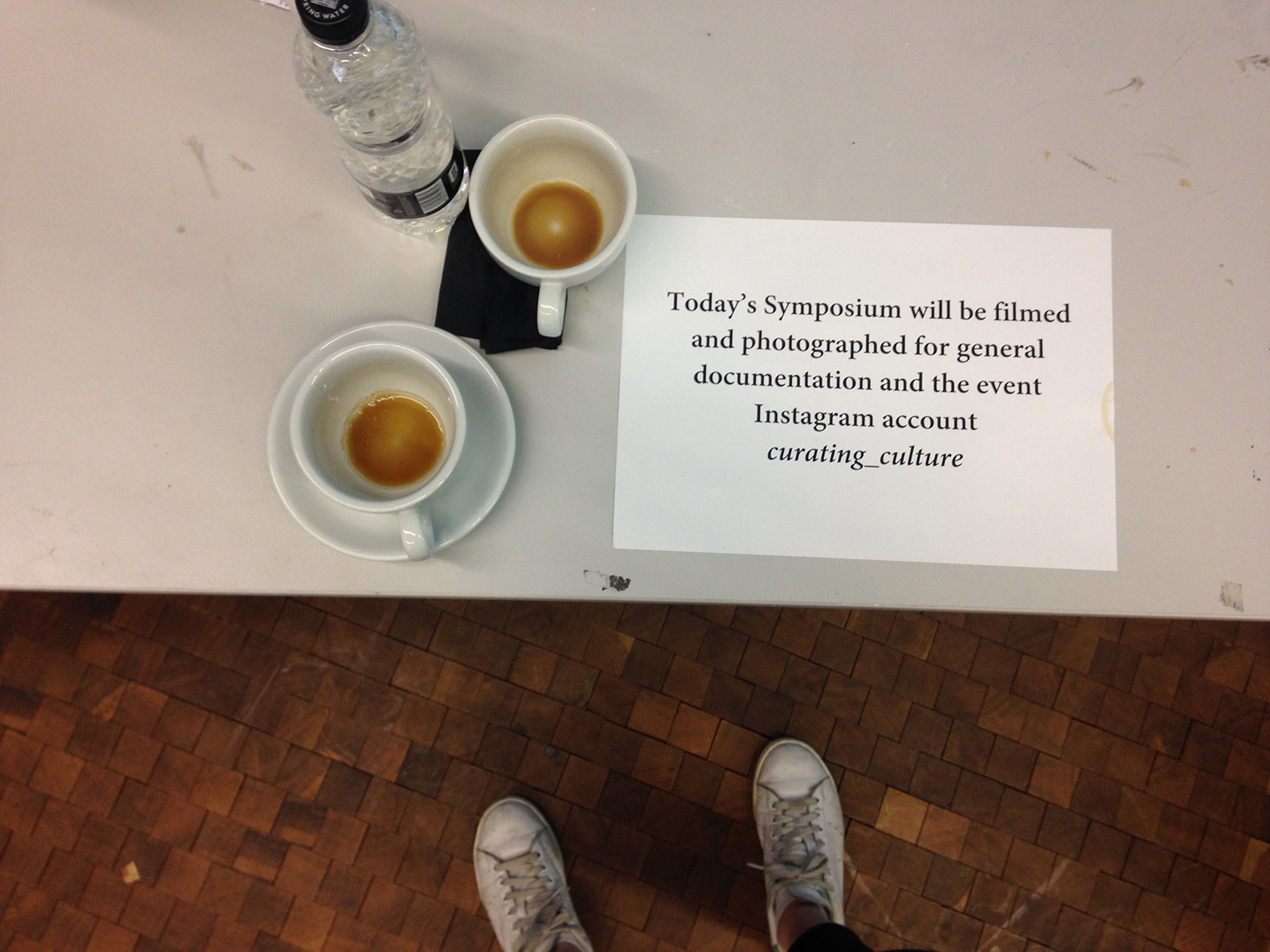
Curating Culture, Networking lunch, 12:30 - 13:30
There you have it. Let’s eat. The brown bags are labelled meat, vegetarian, vegan. Andy Pratt wishes bon apetit and once again advises the attendees to take the opportunity to mix with people they haven’t met before. Some participants leave during the lunch break while others join us.
What is a hub, cluster, network and why does it matter? Session 3, 13:30 - 14:00
All six tables are now occupied. The beamer is switched on. Dr. Tarek Virani from Creative Works gives an insight into his research project on the topic of what hubs/clusters can achieve and what differentiates them. He tends to end his sentences with a question seeking confirmation: right? He says right a lot within sentences too, as if needing to make sure of himself again and again. He ends his short presentation with a film about the future of workspaces in London’s creative economy. The video stopps on “Music by Tarek Virani”. The forceful tunes kind of glorify the coolness of these types of places. The attendees applaud.
After a quick Q & A, we move directly to the next speaker. No group discussion. Jack Fortescue introduces Acme, a housing association that rents out affordable studios to artist. The audience follows him attentively as he gives a brief overview of its history and soon moves on to their current practice and problems. The audience responds with great interest and lots of questions.
Wider contexts, Session 4, 14:00 - 15:00
With Ian Freshwater from Argent, the developer and part-landowner of the Kings Cross area, the discussion comes closer to the site of today`s panel.
Contributor’s quote: Whilst Ian Freshwater’s talk is factually correct and delivered with the best of intentions, it sits oddly in the day. He talks as if he’s pitching the King’s Cross development in the past tense. For a crowd used to thinking outside the box this generates a mild tension. They’re not the type used to sales pitches.
Wider contexts: cluster, network, local-global hub, Session 5, 15:00 - 16:00
Jodie Eastwood from Knowledge Quarter is the next speaker. During her talk about the conditions that enable innovation in urban space she repeatedly refers to her colleague who wrote a paper on the topic, while laughing loudly and affectionately.
What roles can, and should, art highter education play in these processes? Session 6, 16:00 - 17:00
The concentration in the room begins to fade. Christoph Weckerle and Simon Grand take on the last session. The buffet is cleared once more; the caterers reappear with orange juice and water. The table with the four microphones remains untouched until the end. The remaining people just come together in a more loose formation. The atmosphere feels more and more informal as the day goes on.
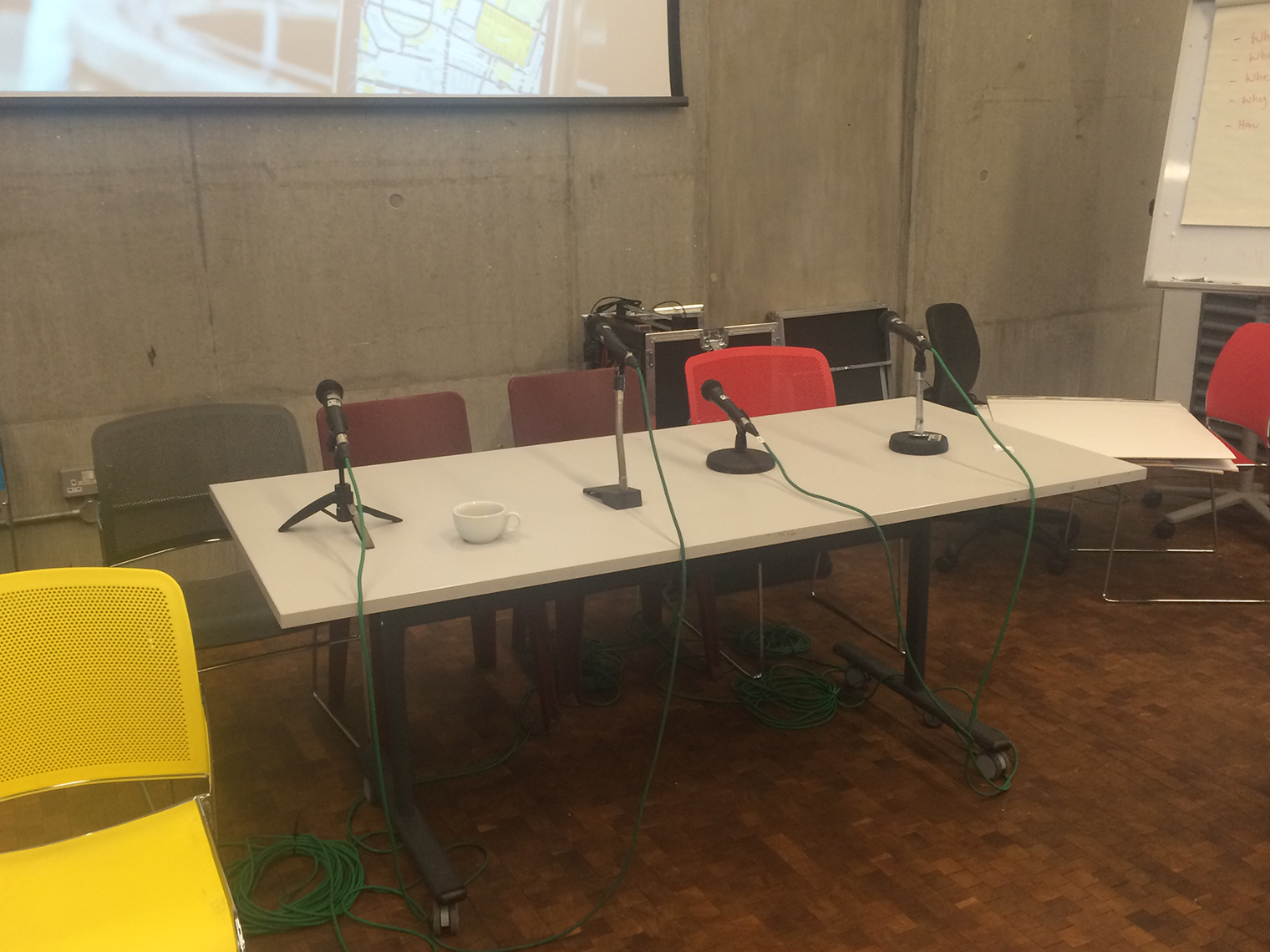
Curating Culture, Networking drinks
On a table near the entrance red wine, white wine and beer are now prepared for the drinks reception. The table is guarded by a young man who looks like he could be a student here: black hoody, beard, and an earing. His radio device suddenly goes off and he scurries from the room, embarrassed.
Mark Dunhill thanks Andy Pratt, Christoph Weckerle and Simon Grand, and suggests a repeat meeting in Zurich next year. He also points out the absurd rule against the self-service of alcohol on campus – we must await the return of the young man before taking a drink.
Most of the participants disappear as quickly as they came. A handful remains and clinks glasses. The atmosphere is relaxed and cheerful.
